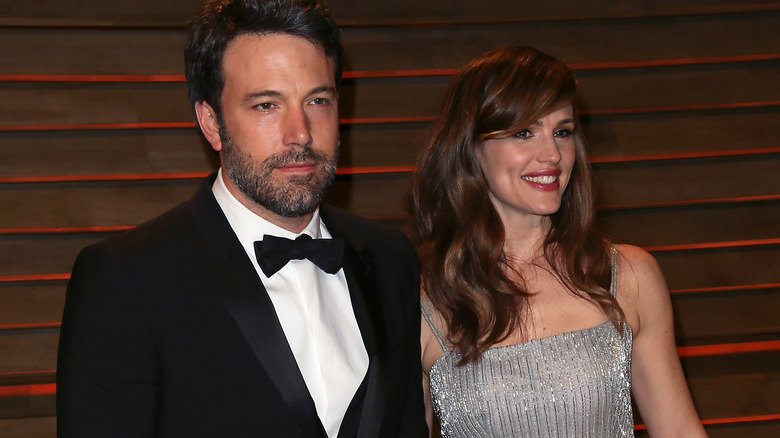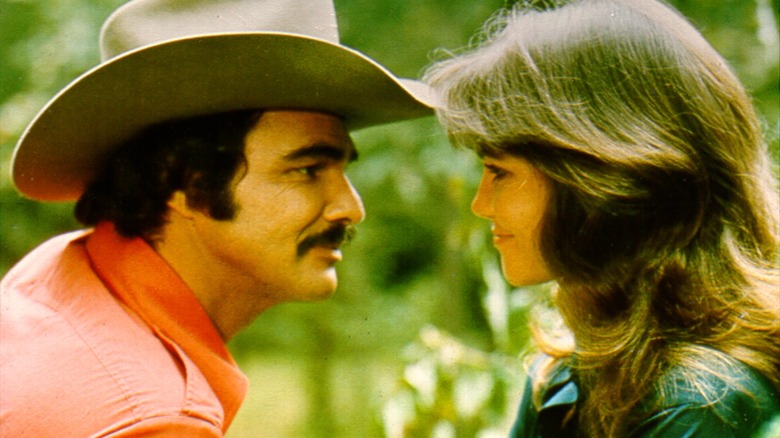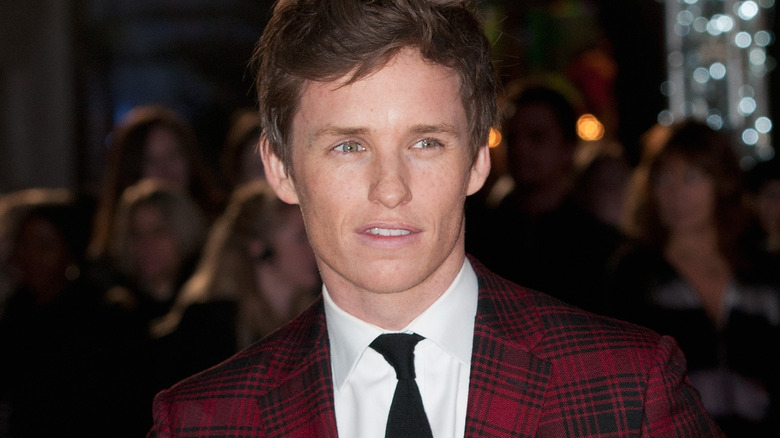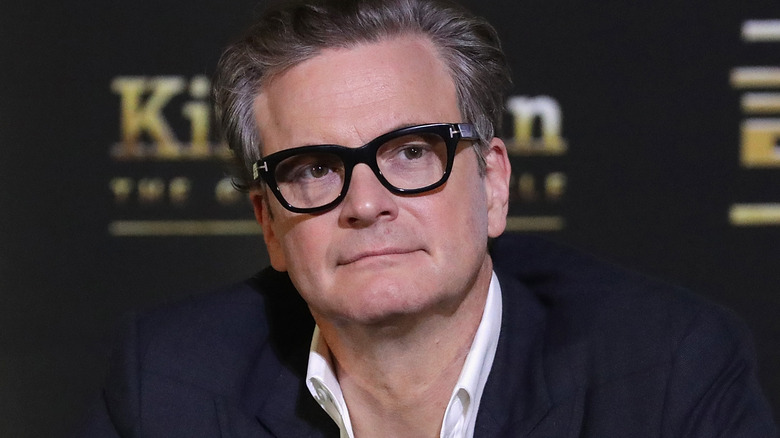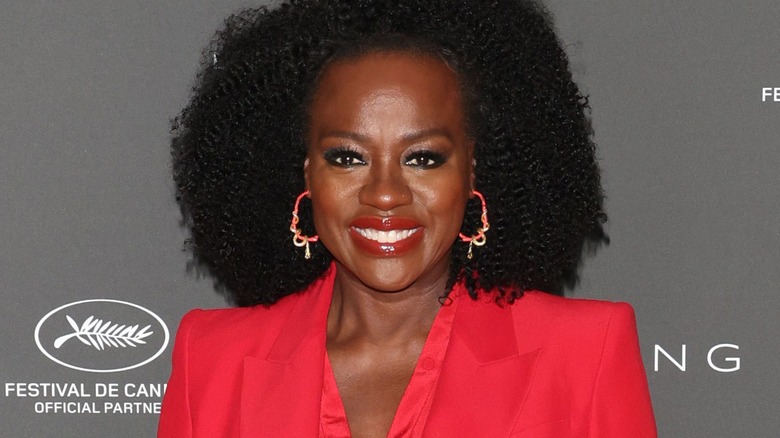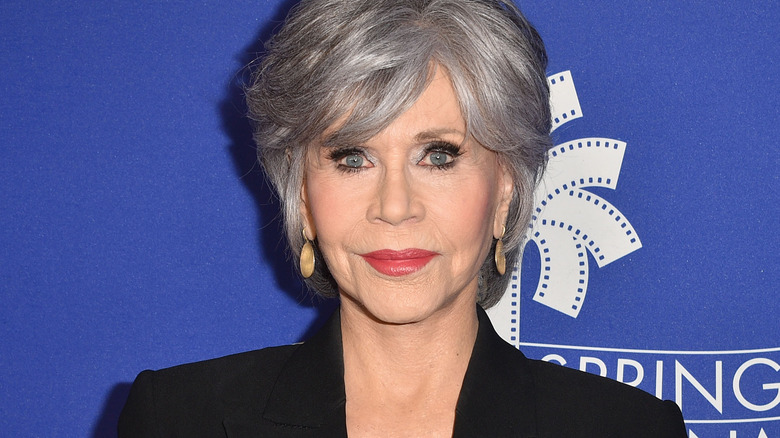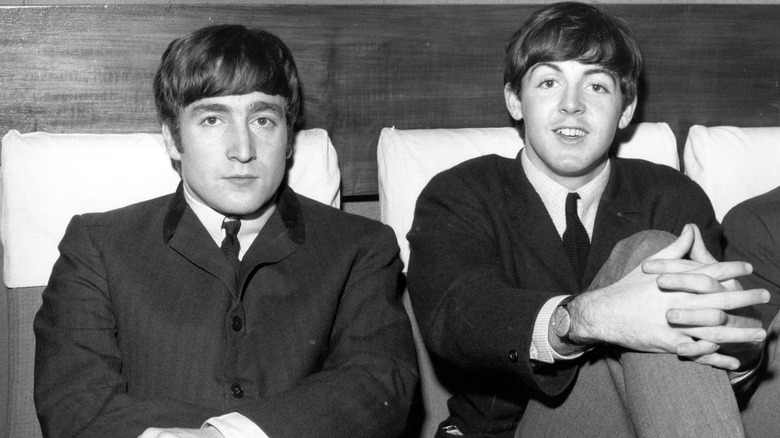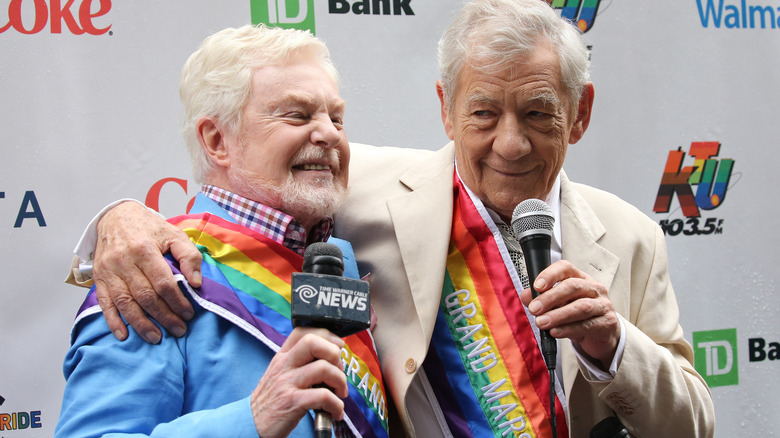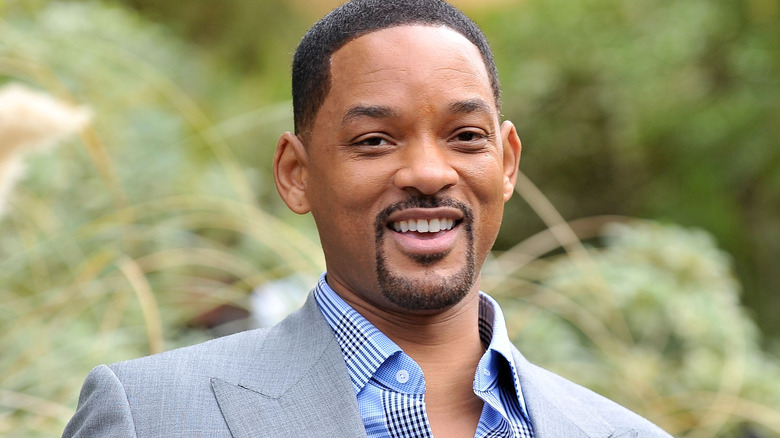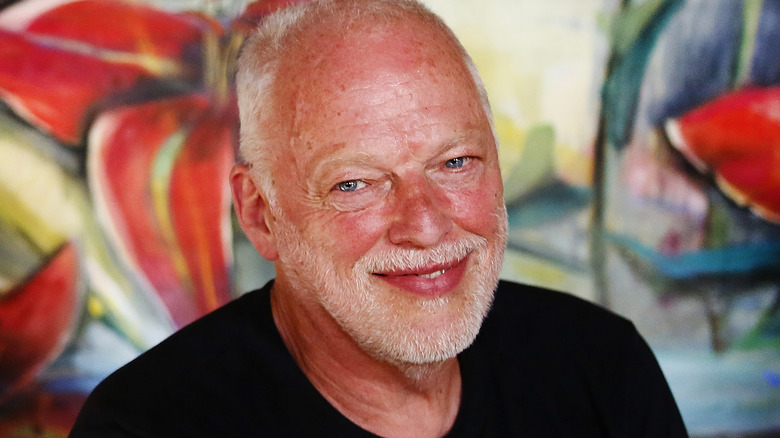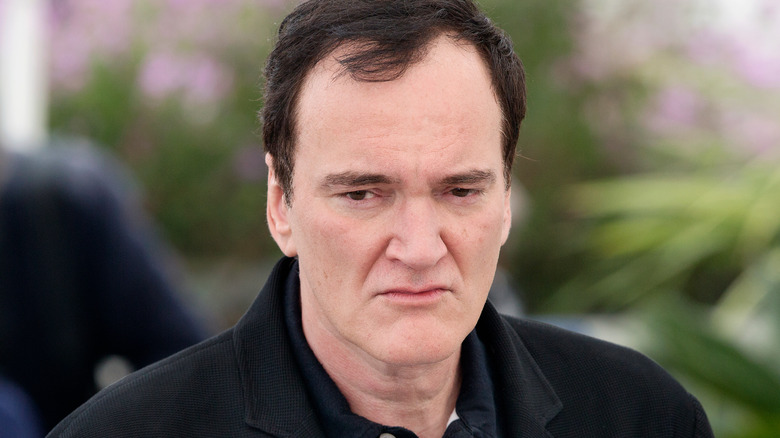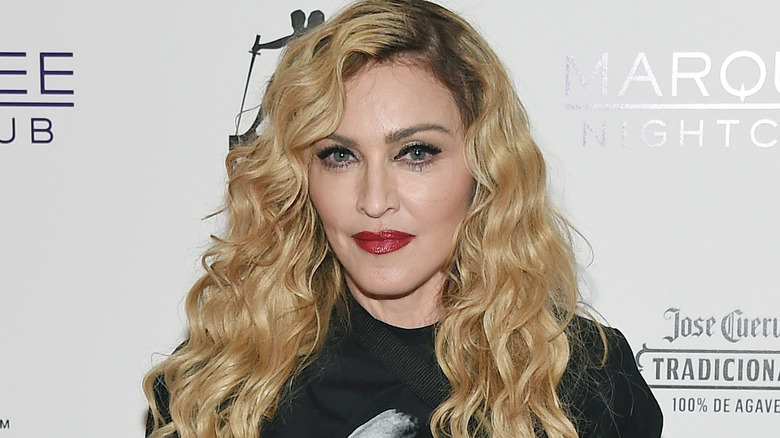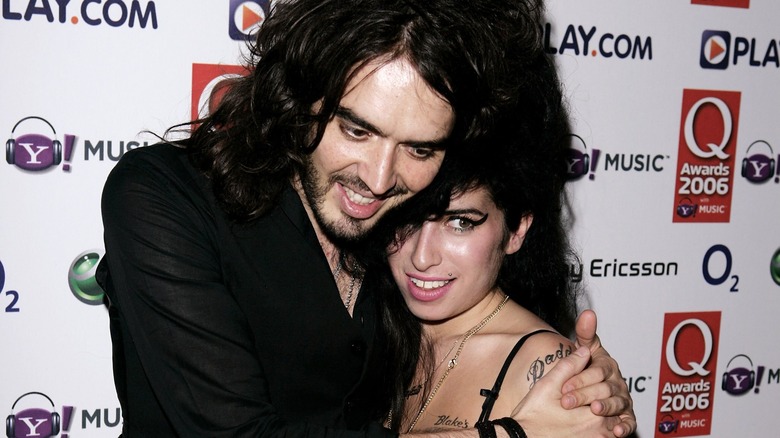The Biggest Regrets Celebrities Have Openly Admitted
The following article contains references to substance misuse, sexual assault, domestic violence, and mental illness
"Regrets, I've had a few." So sang Frank Sinatra (or Sid Vicious depending on whatever floats your boat). A life beset by regret certainly isn't a pleasant one, but regrets are, in turn, a part of life. We all have regrets: Maybe we didn't have the courage to ask "the one" out for a date, or we didn't grab a chance at a different career when the opportunity arose. It takes guts to admit to said lamentations. And doing so is even harder when one's entire life is game for the tabloids.
Undeniably, there's a lot of pressure on celebrities to maintain their public personas. Though we often elevate celebs to celestial status, no one is perfect (no matter how exquisitely crafted their social media feeds may look). Like ordinary folks, the rich and famous are not immune to making errors — and owning up to them. Indeed, everyone has the capacity to learn from and reflect on their past mistakes.
To dwell on self-reproach, however, can be dangerous, as The Guardian highlights. As cliché as it may sound, we cannot live in the past; rather, we can merely live with the consequences of our actions. Sadly, some of these stars have not recovered from the what might have beens. From lost loves and failing to say goodbye to late friends to bad career moves, keep the Kleenex at hand as we give the rundown on the biggest regrets celebrities have openly admitted.
Ben Affleck said that divorcing Jennifer Garner was the biggest regret of his life
Once regarded as one of Hollywood's biggest power couples, Ben Affleck and Jennifer Garner called it quits in 2015, after a decade of marriage. At the time, Us Magazine reported that the split was due to Affleck's alleged affair with the family nanny, Christine Ouzounian, though his reps denied this.
Since he and Garner parted ways, Affleck has reflected bitterly on the breakdown of his marriage. In an interview with The New York Times, he opened up about the personal difficulties that contributed to the couple's divorce. Affleck, who is in recovery from alcohol misuse, began drinking heavily in 2015, exacerbating his marital woes. "The biggest regret of my life is this divorce," he said. Similarly, in a sit-down with Diane Sawyer, he expressed his pain at having mirrored the actions of his own parents, who divorced when he was 12 (like himself, his father is in recovery from alcohol misuse). "I didn't want to get divorced," he admitted. "I didn't want to be a divorced person ... It upset me because it meant I wasn't who I thought I was and that is so painful."
However, as he told The New York Times, he was learning to glean a different perspective on his regrets, acknowledging that shame is a toxic emotion causing him more harm than good. "I have certainly done things that I regret," he reflected. "But you've got to pick yourself up, learn from it ... try to move forward."
If you or anyone you know needs help with addiction issues, help is available. Visit the Substance Abuse and Mental Health Services Administration website or contact SAMHSA's National Helpline at 1-800-662-HELP (4357).
Burt Reynolds regretted not staying with Sally Field
After meeting on the set of "Smokey and the Bandit" in 1977, Burt Reynolds and Sally Field dated on and off for several years, until finally parting ways in 1982. By Reynolds' own admission, he never quite got over the split. In an interview with Vanity Fair, he called Field the love of his life. "I miss her terribly," he said. "Even now, it's hard on me. I don't know why I was so stupid ... You find the perfect person, and then you do everything you can to screw it up."
Speaking to the Daily Mail in 2016, he acknowledged having many regrets, including posing nude and turning down the chance to play James Bond, but admitted that his split from Field was the biggest disappointment of his life. "That sense of loss never goes away," he said, adding that he hoped Field would call him one day so they could have a dialogue about their break-up.
Following Reynolds' death in 2018, Field discussed him in her memoir "In Pieces," detailing many of the toxic aspects of their relationship and the ways in which he hurt her. Subsequently, she told The New York Times that she was glad her late ex would never get to read the book or find out how she really felt. Moreover, in a chat with Variety, she disputed Reynolds' claims that she was the love of his life. "He just wanted to have the thing he didn't have," she suggested.
Eddie Redmayne regrets taking on The Danish Girl
As increased awareness is raised regarding the issue of LGBTQ representation in the media, a number of straight and cis stars have been repentant about taking on such roles in the past. Tom Hanks, for instance, told The New York Times in 2022 that he wouldn't be allowed to play the lead in "Philadelphia" were the film made today.
One actor who has been particularly remorseful about playing an LGBTQ character is Eddie Redmayne. In 2015, he portrayed trans woman Lili Elbe in "The Danish Girl," a role for which he was heavily criticized. At the time, IndieWire argued that the film contributes to "the cisnormative idea that a trans woman is simply a man performing faux-femininity, as Redmayne twirls and vogues his way into womanhood." Although he initially defended his position as a cis man playing a trans woman, Redmayne has since said that he regrets the role.
"No, I wouldn't take it on now," he told The Times in 2021. "I made that film with the best intentions, but I think it was a mistake." He elaborated on this sentiment in an interview with The Guardian two years later, wherein he recalled meeting trans actors at a workshop and learning of the detrimental nature of cis performers taking on such parts. "No one wants to be limited by their gender or sexuality but, historically, these communities haven't had a seat at the table," he said. "Until there's a leveling, there are certain parts I wouldn't play."
Colin Firth regrets not speaking out against Harvey Weinstein
During his producing heyday, Harvey Weinstein was thanked more times than God in Oscars acceptance speeches. Countless stars sang the praises of the now disgraced producer as they waltzed onto the stage to accept their gold statuettes. To his regret, Colin Firth was among them.
In 2017, actor Sophie Dix told The Guardian that Weinstein sexually assaulted her when she was making the film "The Advocate," alongside Firth, in 1990. Despite being vocal about the assault, she said that she was ignored and shunned by those in the industry. "I was met with a wall of silence ... People in the industry didn't want to know about it, they didn't want to hear," she said. The trauma of the incident, she said, effectively ended her Hollywood career.
Subsequently, Firth released a statement to The Guardian in which he expressed deep regret for not speaking out against Weinstein after he discovered what had happened to Dix. "She told me she had had a distressing encounter with Harvey Weinstein ... To my shame, I merely expressed sympathy," he admitted. "I didn't act on what she told me ... I don't know if she remembers telling me, but the fact that I had that conversation has come back to haunt me in the light of these revelations." Dix praised Firth for his honesty and said that he had been supportive of her when she initially told him of the traumatic encounter.
If you or anyone you know has been a victim of sexual assault, help is available. Visit the Rape, Abuse & Incest National Network website or contact RAINN's National Helpline at 1-800-656-HOPE (4673).
Viola Davis regrets agreeing to star in The Help
Despite having been released in 2011, "The Help" is the sort of film that would not look out of place in the notoriously stereotype-heavy golden age of Hollywood, where racist "mammy" depictions were rife. The film is based around what critics term the "white savior complex," a narrative device in which Black characters are depicted as helpless and voiceless, relying solely on the good will of white people for personal emancipation. In the poorly aged plot, Viola Davis and Octavia Spencer play domestic workers whose plight is documented by a young white writer.
Davis has since expressed regret at ever agreeing to do the project. "Have I ever done roles that I've regretted? I have, and 'The Help' is on that list," she told The New York Times in 2018. While she didn't directly criticize those involved in the making of the film — and said that she'd become great friends with her co-stars — she took aim at the absence of a strong Black voice, arguing that the Black characters' narratives were mediated entirely by the white people around them.
She made similar remarks in an interview with Vanity Fair, arguing that the movie contributed to pernicious stereotypes of Black people. "I betrayed myself, and my people, because I was in a movie that wasn't ready to [tell the whole truth]," she said, adding that "The Help" was "created in the filter and the cesspool of systemic racism."
Jane Fonda wishes she'd been a better mother
Speaking to CNN in 2023, Jane Fonda opened up about her perceived failures in life. The Hollywood veteran, who was diagnosed with lymphoma the previous year, said that while she was not scared of dying, she had other fears associated with death. "What I'm really scared of is getting to the end of life with a lot of regrets when there's no time to do anything about it," she confessed. Although she said that she tried not to look back on her life with too much self-reproach, she acknowledged having one major regret when it came to her kids. "I was not the kind of mother that I wish that I had been to my children ... I just didn't know how to do it," she admitted.
She made similar remarks several years earlier, when interviewed by Brie Larson for Net-a-Porter. At the time, she said that she was hoping to mend her relationships with her children before it's too late. "I want them to love me and I have to earn that," she conceded. "I'm still working at it."
The actor herself had a difficult relationship with her mother, who died by suicide when Fonda was just 12, per People. Unable to forge a bond with her mom due to her mental illness — and, in turn, unable to say goodbye to her before she died — Fonda said that she lived with guilt for many years. This may help to elucidate her regrets regarding her own kids.
If you or anyone you know is having suicidal thoughts, please call the National Suicide Prevention Lifeline by dialing 988 or by calling 1-800-273-TALK (8255).
Paul McCartney regrets not telling John Lennon he loved him
When John Lennon was brutally murdered in 1980, Paul McCartney's response to the press was notoriously curt. On the day of the murder, he was accosted when leaving a studio in London and asked to comment on the terrible tragedy, infamously remarking, "Drag isn't it?" Although he may have come across as aloof and uncaring, he later clarified in an interview with Playboy (via Beatles Interviews) that he was too traumatized to express his grief. "We just looked at all the news on the telly," he recalled, "and we sat there with all the kids, just crying all evening. Just couldn't handle it, really."
In recent years, McCartney has opened up about his songwriting partner's death, and elaborated on the depth of his grief. During an event in London in 2021 (via Express), he said that he regretted never having told Lennon that he loved him, something that he attributed to his working class Liverpudlian background. "As 16-year-old, 17-year-old Liverpool kids, you could never say that. It just wasn't done," he reflected. "So I never did ... really just say: 'John, love you man.'" With bromances now being more widely accepted, McCartney said that he has finally been able to embrace the immense love he had for Lennon.
In a bittersweet gesture, he dedicated "Here Today" to Lennon when performing at Glastonbury in 2022, explaining that the song encapsulates the sentiment he wished he had expressed to his late friend, per Sky News.
Ian McKellen regrets not coming out earlier — and asking Derek Jacobi for a date
When Ian McKellen came out as gay in 1988, he was one of the first mainstream actors to do so, arguably paving the way for a whole generation of openly LGBTQ celebs. Despite being a trailblazer, the "Lord of the Rings" star sincerely regrets that he didn't come out much earlier. Opening up to the Huffington Post (via Attitude), he pondered what his life would have been like had he done so. "I regret and always shall that I didn't see the significance of coming out at a much earlier date," he said, "because I think I would have been a different person and a happier one."
Most of all, however, he regrets not telling his family that he's gay, or declaring his love for fellow actor Derek Jacobi, whom he first met when the two were students at Cambridge in the 1950s. He previously referenced this crush, which he poignantly described as "a passion that was undeclared and unrequited," in a 2001 interview with The Advocate.
McKellen expounded on this in a joint interview with Jacobi in the Daily Mail. "I never came out to my family. Biggest regret of my life," McKellen admitted. "Yes, I did fancy Derek, but I didn't act on it, God, no. It was illegal, remember ... There were no gay clubs you could go to. No gay bars ... nothing." Though haunted by these regrets, McKellen has helped so many LGBTQ people through his tireless activism.
Will Smith regrets turning down The Matrix
Will Smith no doubt has innumerable career regrets, most notably his decision to slap Chris Rock in defense of his wife, Jada, about whom Rock was making arguably ableist remarks. The infamous slap backfired epically, as Rock is now raking in millions by milking the slap in his Netflix special, while Smith finds his career in a continuing downward trajectory.
But Smith's poor decision making dates back much earlier than The Slappening. In a "Storytime" posted on his YouTube channel, he revealed that he was offered the role of Neo in "The Matrix," but decided to turn it down as he thought the premise was laughable (producers apparently pitched the film as a series of jump cuts of ... jumps). "So, I made 'Wild Wild West,'" he sighed. "I'm not proud of it." While "The Matrix" grossed over $465 million (the franchise itself has made more than $1 billion dollars worldwide), "Wild Wild West" was a colossal flop.
Though he's able to joke about it now, Smith still holds onto a lot of regret regarding the poorly judged rejection. During an appearance on "The Late Show with Stephen Colbert," he ruminated on the advice he would give to his younger self, admitting that he was naïve in the early stages of his film career. "I just thought of something I would tell my younger self," he said. "I would go back and I would say, 'Hey man, don't do 'Wild Wild West.' I would say, 'Dude, do Neo, do Neo!'"
David Gilmour regrets not visiting Syd Barrett before he died
In 1967, David Gilmour joined Pink Floyd, replacing Syd Barrett, who was struggling with mental illness. Gilmour admitted to Guitar World (via Pink Floyd and Company) that he felt like a mere surrogate for Barrett, his friend of many years prior. After the group abandoned their eccentric singer (legend has it that they simply decided to "forget" to pick him up on the way to a show), Barrett became reclusive, rarely leaving his home over the following three decades.
In an April 2006 interview with Word (via David Gilmour), Gilmour admitted that he hadn't seen his friend since 1975, when he randomly turned up at one of the band's recording sessions. Bald and having gained a lot of weight, Barrett was unrecognizable to his ex-bandmates. "I'd love to go and see him one of these days and maybe I will — before it's too late," Gilmour poignantly admitted. But by this point it was too late: Barrett would be dead by July.
Subsequently, Gilmour is left with immense regret that he never checked in on his pal. "I now have this lasting regret that I was so obedient to the family's wishes not to disturb his peace," he said in 2007, per Female First. "A few years ago, my wife Polly said to me, 'How would you feel if he dies?' I said, 'Regretful, probably.' And I am. I should have gone down there, knocked on his door, and said, 'Hey – let's go for a pint.'"
If you or someone you know needs help with mental health, please contact the Crisis Text Line by texting HOME to 741741, call the National Alliance on Mental Illness helpline at 1-800-950-NAMI (6264), or visit the National Institute of Mental Health website.
Selena Gomez regrets not keeping in touch with her old friends
Before she became an internationally regarded singer and actor, Selena Gomez got her big break on "Wizards of Waverly Place." She became the stand-out performer of the show and went on to experience colossal stardom. Accordingly, Gomez is the first to admit that fame changed her in a destructive way.
The "Only Murders in the Building" star has previously discussed the negative ramifications of being associated with the Disney series. In her documentary "My Mind and Me" (via Cinema Blend), she disclosed that she resented the Disney kid label that followed her around years after "Wizards" ended. But she has other, long lasting regrets associated with the show.
During a 2023 appearance on the "Wizards of Waverly Pod," hosted by the show's stars, Jennifer Stone and David DeLuise, Gomez admitted that she deeply regrets not staying in touch with her former co-stars, leading to tears from DeLuise. "I felt ashamed of the decisions that I made," she said. "And I didn't want you guys to see me in the state that I was in, because a. you would have told me the truth, which terrifies me, and b. I didn't want to let you down."
Stone said that she appreciated Gomez's honesty, admitting that she was hurt by her co-star's decision not to stay in touch. "To be perfectly blunt, there has been times where I'm like, 'Did we stop being friends because I didn't tell her what she wanted to hear?'" Stone said.
Quentin Tarantino regrets putting Uma Thurman in harm's way
In 2018, Uma Thurman opened up about her traumatic (and life-changing) experience filming Quentin Tarantino's violent martial arts flick "Kill Bill." The actor told The New York Times that Tarantino pressured her into performing a highly dangerous driving stunt on a sandy road (he allegedly misled her into believing that both the car and road were safe).
When the stunt went horrifically wrong, Thurman almost died. She suffered severe injuries, resulting in a "permanently damaged neck and my screwed-up knees." At the time, Thurman said Tarantino was unrepentant about the harm he had inflicted upon her. What's more, she was encouraged by Harvey Weinstein, the film's producer, to sign a waiver that would exonerate Miramax from any legal repercussions were the injuries to have lasting impact. She refused. "When they turned on me after the accident," she explained, "I went from being a creative contributor and performer to being like a broken tool."
Following the revelations, Tarantino confessed that putting Thurman in harm's way was his number one regret, though he insisted that it was not the result of artistic sadism, but an honest mistake. "Just horrible," he told Deadline of the crash. "Watching her fight for the wheel ... remembering me hammering about how it was safe and she could do it ... It was heartbreaking. Beyond one of the biggest regrets of my career, it is one of the biggest regrets of my life."
Madonna regrets getting married
Unlike many of her contemporaries, who are game for saying "I do" thrice, quarce, and even quince, Madonna has been married a paltry two times. But even that number's too high for Her Madgesty. In a "50 Questions" video posted on her YouTube channel, the pop icon was asked, "What's a decision you made that, looking back, maybe wasn't the best idea?" Madge replied, "Getting married. Both times." Ouch!
This wasn't the first time Madonna expressed regret over getting married. In a 1993 chat with Interview, she quipped, "I think that everyone should get married at least once, so you can see what a silly, outdated institution it is." This was in reference to her first ill-fated marriage, to Oscar-winner Sean Penn. As detailed in a 1991 Seattle Times report, Penn was accused of viciously beating Madonna, gagging her, and tying her to a chair — claims that he denied. At the time, Madonna appeared to reference the allegations in her song "Till Death Do Us Part," which contains the lyrics, "He takes a drink, she goes inside/He starts to scream, the vases fly." Although the singer later denied that Penn ever beat her, she referred to her ex as an "a**hole" during a concert (via The Mirror) in 2016.
Meanwhile, she has reflected bitterly on her second marriage, to filmmaker Guy Richie, with whom she had an acrimonious divorce. "There were times when I felt incarcerated. I wasn't really allowed to be myself," she told The Sun (via Grazia).
If you or someone you know is dealing with domestic abuse, you can call the National Domestic Violence Hotline at 1−800−799−7233. You can also find more information, resources, and support at their website.
Russell Brand regrets not doing more to help Amy Winehouse
These days, Russell Brand is generating headlines for his apparent shift towards the right, which is in marked contrast to his longtime claims of being a communist. But before he became a conspiratorial YouTube pundit, he was known for his efforts to raise awareness of substance misuse. Having recovered from addiction issues himself, he has advocated for a holistic and compassionate approach toward the sorely misunderstood illness. But according to Brand, he perhaps learnt too late the importance of helping those going through such issues.
Brand was close friends with singer Amy Winehouse, who sadly died in 2011, aged just 27, after years of struggling with substance misuse. Speaking to The Sun (via The West Australian) a year after Winehouse died, Brand expressed regret at not doing more to help his late friend, particularly as he had long been plagued by a sinking feeling that she would die young. "I got clean at the age of 27, the age Amy was when she died," he explained. "Amy's death was a paradoxical unsurprising shock. I felt like I could have done something to help — to give her the chance I had ... I feel a bit guilty that there was nothing I did."
Paying tribute to Winehouse in an essay for The Guardian, Brand emphasized the importance of alleviating the stigma surrounding substance misuse. "We need to review the way society treats addicts, not as criminals but as sick people in need of care," he wrote.
If you or anyone you know needs help with addiction issues, help is available. Visit the Substance Abuse and Mental Health Services Administration website or contact SAMHSA's National Helpline at 1-800-662-HELP (4357).


